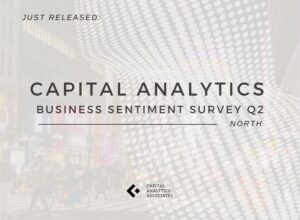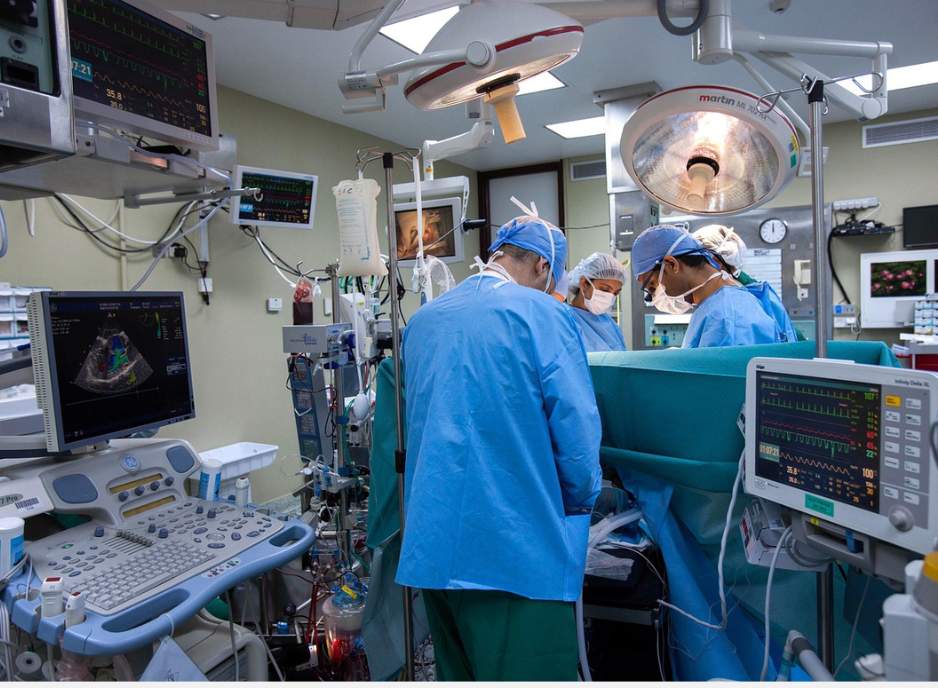Writer: Ryan Gandolfo
 July 2023 — The inaugural Capital Analytics Business Sentiment Survey (CABSS) of 50-plus public and private sector leaders based in Northeastern markets revealed a degree of uncertainty in the second quarter and for the remainder of 2023.
July 2023 — The inaugural Capital Analytics Business Sentiment Survey (CABSS) of 50-plus public and private sector leaders based in Northeastern markets revealed a degree of uncertainty in the second quarter and for the remainder of 2023.
Covering major industries from banking and finance, healthcare and life sciences to education and infrastructure, among others, the Q2 Northeast CABSS showed a small majority (55%) of respondents feel their regional economy is in a better place than the start of 2023 while just under one-third (29%) share a negative viewpoint on the trajectory of their regional economy.
 “Capital is more expensive for companies these days, so we have shifted our business to be on a path to profitability,” said a Massachusetts-based professional services firm CEO. “This has required significant changes to how we sell, serve clients, and market our services, with a focus on contribution margins. Almost all of our lines of business are contribution margin positive, and we are working towards achieving break-even. This response is necessary given the times; all startups and technology companies are facing similar challenges.”
“Capital is more expensive for companies these days, so we have shifted our business to be on a path to profitability,” said a Massachusetts-based professional services firm CEO. “This has required significant changes to how we sell, serve clients, and market our services, with a focus on contribution margins. Almost all of our lines of business are contribution margin positive, and we are working towards achieving break-even. This response is necessary given the times; all startups and technology companies are facing similar challenges.”
Scarcer capital due to a higher interest rate environment and concerns over a looming recession were commonly cited among respondents, however, some market leaders are anticipating a soft landing.
“I think the U.S. economy continues to be one of the strongest and most resilient in the world despite the burden of rising interest rates and high inflation, which is showing signs of potentially decreasing,” said a New York metro banking executive. “The recession risk is something that we continue to keep our eyes on as does any prudent financial institution or corporation. We think that this may manifest as a shallow and short recession rather than a hard landing, particularly given the current job strength. The big question here remains what is the extent of the cooling that we’ll see as a result of the Federal Reserve’s action and whether the Fed will then pause.”
This week, the Fed convenes for a two-day policy meeting, with derivatives marketplace platform CME Group forecasting a 98.6% probability that the target rate will increase 0.25% on Wednesday. The rate hike would take its benchmark interest rate to a range of 5.25%-5.50% — the highest level since 2001.
Despite uncertainty in the markets, roughly six in 10 respondents (61%) anticipate business revenue to grow throughout the rest of 2023 while 28% see their revenues remaining steady over the next two quarters.
 Among those surveyed, government funding has helped accelerate growth and innovation in key industries from advanced manufacturing and life sciences to cleantech. “In climate tech circles, we often talk about before and after the Inflation Reduction Act (IRA) legislation because it has been such an influential piece of legislation in our industry and in activating capital into the tech space, accelerating the pace of the solution set across the board on electrification, deep decarbonization technologies as well as basic household-level deployment,” said a Boston-based fintech CEO.
Among those surveyed, government funding has helped accelerate growth and innovation in key industries from advanced manufacturing and life sciences to cleantech. “In climate tech circles, we often talk about before and after the Inflation Reduction Act (IRA) legislation because it has been such an influential piece of legislation in our industry and in activating capital into the tech space, accelerating the pace of the solution set across the board on electrification, deep decarbonization technologies as well as basic household-level deployment,” said a Boston-based fintech CEO.
“On the manufacturing front in the Greater Boston area, I’ve seen a massive proliferation of new investment into advanced manufacturing. In the state of Massachusetts, about $1 in every $5 invested in venture capital goes to climate or cleantech companies. It has long been a hub with MIT and Harvard to drive innovation. But now it’s also driving investment into those other spaces.”
Higher anticipated revenues are driven by a noticeable increase in demand over the past two quarters. Among the CABSS respondents, three in four (75%) noticed an increase in customer demand for products in services over the past six months, while only 12% saw a slowdown in demand.
 “There’s a strong demand for services from our large Tier 1 investment management team in both good and challenging economic times. We also are seeing an increase in demand for SEC enforcement and compliance initiatives,” said a Pennsylvania-based law firm office leader. “Where we have seen some slowdown in demand, which I believe all law firms have, is in the M&A field. With interest rates rising rapidly, it has been difficult for businesses to price and value potential transactions. Market uncertainty is not ideal for business transactions, and some clients have put their plans on pause to assess the situation.”
“There’s a strong demand for services from our large Tier 1 investment management team in both good and challenging economic times. We also are seeing an increase in demand for SEC enforcement and compliance initiatives,” said a Pennsylvania-based law firm office leader. “Where we have seen some slowdown in demand, which I believe all law firms have, is in the M&A field. With interest rates rising rapidly, it has been difficult for businesses to price and value potential transactions. Market uncertainty is not ideal for business transactions, and some clients have put their plans on pause to assess the situation.”
The demand has created a more competitive hiring environment across industries, with a Boston area executive telling Invest: that they actually saw a decrease in demand since they’ve struggled to hire staff to carry out operations.
In the higher education sector, some colleges and universities are experiencing lower application and enrollment rates. “I think as a business model, higher education should have gone out of business 15 or 20 years ago. Higher education today needs to be much more innovative, flexible and creative. We are trying to do that with our programs now in the sense that we’re thinking about providing stack certificates and allowing people to progress at their rate rather than the rate that we prescribe,” said a Pennsylvania-based university president.
Much like the rest of the country, the majority (62%) of public and private sector leaders are currently looking to hire more workers — especially in fields such as healthcare, manufacturing and professional services.
 “The talent pool has shifted across all industries, necessitating adjustments in compensation, benefits and work-life balance. The pandemic has also reshaped work preferences, with hybrid work and remote options being in high demand,” said an accounting executive based in Pennsylvania.
“The talent pool has shifted across all industries, necessitating adjustments in compensation, benefits and work-life balance. The pandemic has also reshaped work preferences, with hybrid work and remote options being in high demand,” said an accounting executive based in Pennsylvania.
The growing preference for hybrid or remote work has taken a toll on Downtown areas across the Northeast. “These challenges have made downtown areas seem empty and unappealing, which is a problem faced by most cities,” a nonprofit president & CEO told Invest:. To reinvigorate some of the nation’s oldest metro areas, mayors have been calling for more conversion of underutilized office buildings to residential — a challenging task for developers trying to meet city standards and zoning codes. According to CBRE, nearly 500 buildings and 50,000 new housing units have been converted from 2000 through the fourth quarter of 2022.
Business communities across the Northeast are looking for more support from local governments, as indicated by the minority of respondents (47%) who feel government policies and initiatives lead to the success of businesses in the region. A quarter of those surveyed took a neutral stance while 28% feel governments aren’t doing enough to support businesses.
 The primary concerns cited were higher tax rates and tighter restrictions, particularly from a development standpoint, but some noted the long-term need for tight regulations. “While regulatory processes may be lengthy and sometimes frustrating, they’re in place to encourage developers to think about the long-term implications of their projects,” said a Massachusetts-based engineering firm president & CEO.
The primary concerns cited were higher tax rates and tighter restrictions, particularly from a development standpoint, but some noted the long-term need for tight regulations. “While regulatory processes may be lengthy and sometimes frustrating, they’re in place to encourage developers to think about the long-term implications of their projects,” said a Massachusetts-based engineering firm president & CEO.
“For example, Logan Airport, owned and operated by the Massachusetts Port Authority, was the first airport to have a complete sustainability plan and consider coastal resilience. Similarly, Boston’s leaders and businesses are keenly aware of sea level rise and are taking an active approach to mitigating its effects by using natural elements, such as coastal resilience.”
Heading into the latter half of 2023, businesses and organizations in the Northeast will continue to monitor Fed rate decisions and prepare for a potential “soft landing” as the U.S. economy enters a new period of uncertainty.
To view our Q2 CABSS survey for southern markets, click here.
For comprehensive business intelligence reports on 20 U.S. markets, click here to register.














